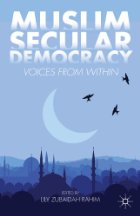
Christopher Houston, head of the Department of Anthropology at Macquarie University, Sydney, raises some interesting questions in his contribution to Muslim Secular Democracy, “Militant Laicists, Muslim Democrats, and Liberal Secularists: Contending Visions of Secularism in Turkey”.
Do those of us who believe in a secular democratic system need to broaden our vision of what a secular democracy can look like? Is our democratic way of life potentially threatened more by new social groups (Muslims) emerging in our midst of by our unfounded fear of those new groups? Is a Muslim-led government ever compatible with a secular society?
Does Turkey (and Egypt?) have anything to teach us about the future of democratic institutions in a world (Western and beyond) that is destined to find Muslims playing an increasingly influential role?
 The reason Turkey’s conservative Muslim party (AKP, the Justice and Development Party) and its supporters favour the Western democratic system is simple. They represent the majority. It is the democratic system that has brought them to power, firstly in 2002, and again in 2007 and 2011.
The reason Turkey’s conservative Muslim party (AKP, the Justice and Development Party) and its supporters favour the Western democratic system is simple. They represent the majority. It is the democratic system that has brought them to power, firstly in 2002, and again in 2007 and 2011.
There are many “middle ground” Turks, too, who are apparently content enough with the current system even though they may not all vote for the AKP. These middle-of-the-roaders are not Islamists. But they seem to be content enough to accept the re-election of the AKP Muslim party. The AKP does, after all, “claim to be inspired by secularism and democracy” (Houston, p. 255).
There are other “secularists”, however, who fear the democratically elected Muslim party is attempting to “Islamize” the nation by stealth, and these people are increasingly expressing disenchantment with Western-style democracy on the one hand, and a preference for a military coup on the other. Though a minority, they do have close ties with key military figures who are sympathetic to their views.
We saw what happened in Egypt, and before that, in Algeria, when democratically elected Muslims found themselves removed by the military. Both coups appear to have had significant popular support.
What leads them to believe that the democratically elected Muslims are secretly turning Turkey into an Islamic state?
The fear and the facts
Houston writes:
The perception that the AKP is intent on Islamizing Turkey is historically a long-lasting fantasy . . . Its reproduction and propagation in the present, however, is indicative of a somewhat paranoid disregard of two decades of research on the so-called Muslim movement in Turkey, and on the very heterogeneous ways that it expresses its religious sentiments in political terms. (pp. 257-58)
Happily the majority of Turks have found this fantasy unconvincing.
When in 2010 the AKP sought a referendum on 26 points to amend the Turkish constitution, fearful Turks saw this as an attempt to consolidate an Islamist program for Turkey, despite the fact that those amendments:
- empowered civilian courts over military courts
- strengthened gender equality
- furthered protection of children, elderly, disabled, veterans
- improved privacy rights
- promised greater access to government records
- increased collective bargaining rights
- enhanced the ability of individuals to make constitutional challenges
- removed immunities for those responsible for the 1980 military coup
Houston informs readers that those Turks most fearful of their Muslim Party dominated government have been energetically seeking to sway public opinion to share their fears. Thirty-five different websites, published in both English and Turkish, for this purpose, “were all organized from a single office managed by a retired navy officer in collaboration with staff in the Turkish armed forces.” (p. 259)
Ironically it is now militant laicists that most resemble an older, imagined portrait of radical Islamists. Militant laicists are searching for a revolution geared toward a takeover of state power to reimpose their program of militant laicism from above.
Further, much of their rhetoric suggests that they are not immune to the seduction of political violence or terror; and most of all they are not committed to, or even feel threatened by, “democracy” and legal reform, because it appears to dilute their political and economic domination. (p. 259, my emphasis)
So why do some Turks feel threatened by the AKP government? Houston writes that of the hundreds of pieces of legislation enacted by the conservative Muslim government (from meat importation, disability standards, rubbish collections, IVF regulation) there has not been a single “Islamist law” passed. Laws enabling the opening of nightclubs in Istanbul are passed but the fearful continue suspect that this is just a cover for plans to do the opposite.
The AKP’s political platform is set out in a documents titled “Conservative Democracy”. It states that democracy must be an arena that allows for compromise. Democracy, it states, (or rather the forward written by current Turkish PM Erdoğan states), is a
system [or procedure] that enables different or even opposed styles of life, as shaped by different goals and values scales, to live in the same place together in peace.(p. 259)
Houston also discusses the way he believes Western media has often acted as a megaphone for the fears of the minority of militant secularists who harbour irrational fears of the conservative Muslim government.
Not that all who are opposed to the AKP are militant secularists. Indeed, the militant secularists express loathing for their more pacific colleagues, labeling them dismissively as “liberals”.
Success breeding weakness
Ironically, it appears that the electoral success of the conservative Muslim party has, in bringing with it further education of conservative Muslims, increased social and class divisions among those Muslims. They are losing their coherence as a united political group as social and gender divisions increase among them.
Rise of Post-Islamism
Many Muslims in Turkey are now post-Islamist. Perhaps the most striking analysis is found in the recently published autobiography of Mehmet Metiner. . . . In it he describes his political evolution, from his years as a student activist in the National Salvation Party (MSP) and as a member of the Islamist youth movement Aknicilar in Faith in the late 1970s to his rejection in the mid-1990s of the foundational tenets or paradigm of political or “Jacobin” Islam, including the imposition of sharia law on the population through establishment of an Islamic state. He proceeds to justify his reasons for embracing democracy and secularism. (p. 261)
I found that interesting. Kind of like observing how some of the radical youth of the 60s ended up as conservative corporatists and supporters of ongoing State imperialist ventures.
Metiner is clear that he is not writing “a confession”. He want readers to understand his own journey of self-criticism and to engage in a serious debate and discussion of the factors that were significant in his journey beyond “Jacobin” Islam.
The future stability of democracy in Turkey would appear to depend upon the public being able to accept competing visions of secular democracy. Does such a state necessarily require rules to deny the ability of sectarian religious parties from winning elections? It appears not. That is, religious parties, even conservative Muslim ones, can safeguard democratic and secular values.
My own habits of thought find that difficult to grasp, but I have to accept the reality of what seems to be happening in Turkey and ask if this does really indicate promise for a stable democratic future in a changing world. I’m reminded of the research data showing that Muslims in America do buy into the American dream. It is where they are marginalized, as in Europe, that we seem to see the serious social problems.
The situation in Turkey is obviously quite different from what Egypt has been going through recently, but I do wonder if Houston’s analysis does have any relevance for the recent military overthrow of the Muslim Brotherhood from power there.
Interesting times. Confusing times. Much to learn and understand.
If you enjoyed this post, please consider donating to Vridar. Thanks!


Let success breed weakness (moderantion) for the erstwhile religious fundamentalists. I’m reminded of the OT stories of prospering Israel, falling away from Jehovah and embracing other gods. Can we promote things evolving this way?